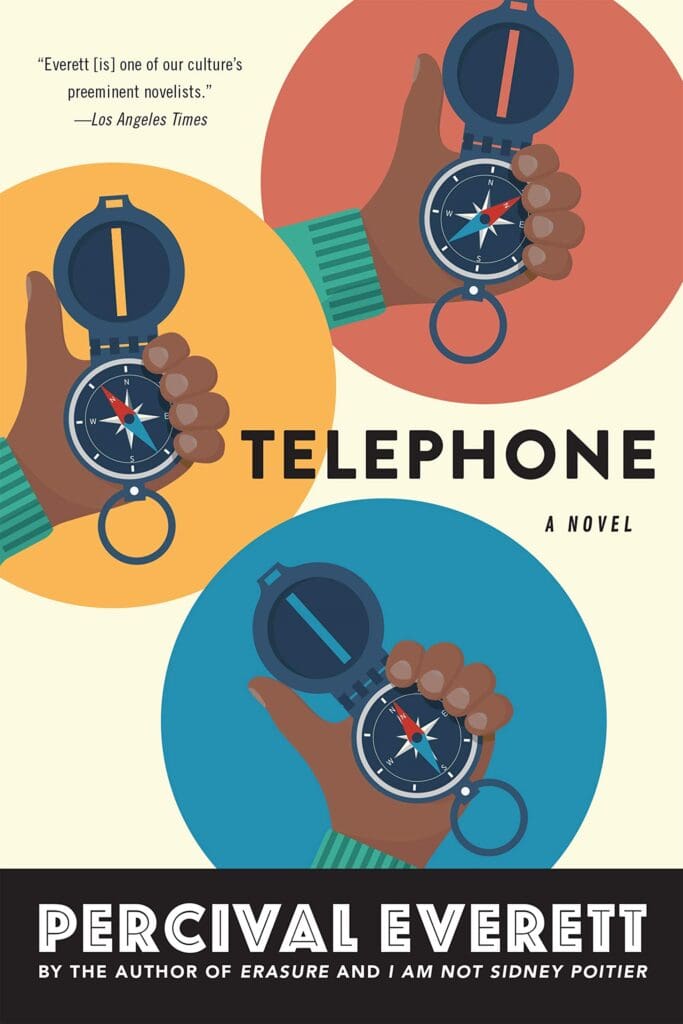One can read Percival Everett’s latest novel entirely ignorant of why it is titled Telephone (232 pages; Graywolf Press), as I did, or one can be in the know. Supposedly there is an A, B, and C version, and thus the title. I have read the B version, and that’s my story, and I’m sticking to it. Discrepancies may occur, or indeed will occur, and like those dinner parties in which everyone argues over whether the superior novel is Mrs. Bridge or Mr. Bridge, now we can convene to argue our preferred version of Telephone, except I think this may be the least interesting aspect of a Percival Everett world, his ability to multiply its possibilities. I think this because powerlessness is so often his subject—and so the ability of the mind to refract is wishful thinking, magical thinking, and when all is said and done the world, or the forces within it that destroy the life and spirit, remains immutable. Zach Wells can do nothing at all to save his twelve-year-old daughter from Batten disease. Even that body he has helped create, has nurtured and has loved so much, even that body mocks him, entering puberty, beginning to menstruate even as she spirals into dementia.
I don’t mean to be less than playful, but the futility of play might be on display here in Telephone, which begins with an epigraph from Soren Kierkegaard:
I see it all perfectly; there are two possible situations—one can either do this or that. My honest opinion and my friendly advice is this: do it or do not do it—you will regret both.
Reading Everett is usually an experience of reckoning, and not just for a protagonist against the ugliness his life has served him up, but a reckoning, also, for a reader in her oh-so-comfy chair, the unnerving drama of the story reaching out and grabbing her by her face, You. You think you know best, you think you’d do it different, you think you’d know? You know nothing. There is always a hugely satisfying clarity to Everett’s work, a clearing out of cant and ideology and best intentions, and a showing of the cool hard landscape of what is. There is hardly a writer in the language I respect more than Percival Everett, and it’s because of this cold bead. He has the intellectual and aesthetic agility to just blow us out of the water, but he does the more lasting, though perhaps crueler, more respectful thing of putting us at the center of an extremity, calling into question our own bustling officious ideas of agency, the gun just out of sight.
To say I emerge a more honest person after reading Everett is an understatement, and it’s his gift to us, but at what cost? Because that’s another reckoning, how an author gets toted up, thought of, regarded, how he continues to abide knowing what he knows about his work from others. One feels so often a disconcerting closeness when reading Everett’s prose, an interrogatory intimacy. That’s not a game of telephone, that’s one call to one ear, no interference, no static, no more salacious version to be gotten elsewhere; the reader just has to accept the call, to listen.
That’s why I think a novel with three versions is much more about readers than about the work of Everett, much more about reception than about content, and it’s cautionary. Really, that’s what you want? Here ya go! Tell me when you start to feel more powerful.
Zach Wells is a geologist-paleobiologist and he is the world’s leading expert on the contents of Naught’s Cave in the Grand Canyon, a cave full of pack rat nests and pack rat middens, what a pack rat keeps close, what a pack rat tosses off, and the reader is treated to an anatomical accounting that helps little to distinguish, nest? midden? It’s not called Naught’s Cave for nothing, but nihilism is not an aspect of Everett’s work. It matters a great deal that Zach Wells continues to act, to do, to analyze and categorize, to think, to dream, to love, to hate; it matters a great deal that he does this all in the face of great pain; it matters that he feels it all, that he remains a vital response to powerlessness—that alone is what he has power over, his response. He will regret it all, of course, how can he not? It doesn’t change anything, it doesn’t prevail, or win, or nudge the natural laws of the universe into gentle compliance to human desire. But he will have done it all within the pall of great pain, and that is its own mastery, its own human dimension. Not heroic, but not witless, either.

